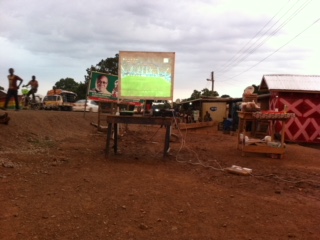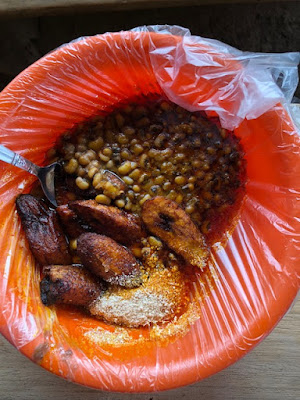Early days as an EUAV
The beginning of my EUAV assignment
in Kongo, Ghana
My arrival time in Accra should have been 5pm,
a good time to arrive, just in time to reach the hostel before nightfall and
shake out tired legs. Instead, I arrived at 2 am, 8 hours late with swollen
legs and to sleepy immigration officers. My journey to Ghana was everything but
smooth. The day before at the airport in Paris, we were stuck at the gate in an
overheated airplane for 3 hours due to a technical malfunction and strict
immigration laws that prohibited us from disembarking the aircraft. After the
pilot deemed the vessel unsuitable for flying, we were told to change planes and finally allowed to disembark-
luggage, crying babies and duty-free shopping bags in tow. Once at the new
gate, aircrew personnel informed us that our flight had been unexpectedly
re-routed to Lome. Later that night in Lome, our onward journey was again
delayed by another two hours. You would think that passengers by then would have
been raging mad, but most of them were West African and one passenger next to
me just chuckled and said “welcome to Africa”. I fell to bed exhausted that morning
and woke up a couple of hours later to chirping birds and Nigerian pop music.
 Being German has been an easy
conversation-starter here, particularly because my arrival coincided with the
knock-out round of the FIFA World Cup. Germany, the former World Champion, had
just been defeated by South Korea, a country more known for its 10-step skin
care routine than world-class football. As a response to my nationality, I keep
hearing “ah, it really pains me about Germany” or simply, “what happened?!”.
But Ghanaians can relate as they share a shameful story with their national
team, the Black All Stars, who lost the qualifying match due to a corruption
scandal within the team.
Being German has been an easy
conversation-starter here, particularly because my arrival coincided with the
knock-out round of the FIFA World Cup. Germany, the former World Champion, had
just been defeated by South Korea, a country more known for its 10-step skin
care routine than world-class football. As a response to my nationality, I keep
hearing “ah, it really pains me about Germany” or simply, “what happened?!”.
But Ghanaians can relate as they share a shameful story with their national
team, the Black All Stars, who lost the qualifying match due to a corruption
scandal within the team. The distance from Accra to my assigned village,
Kongo, in Ghana’s Upper East Region is a 15-hour bus journey. The borders of
Ghana and much of Africa were carved in artificial lines by the colonizing
powers, which came to be known as the ‘Scramble for Africa’ and culminated with
the Berlin Conference in 1884. After World War I Ghana’s northern border was
again rewritten when the Upper East and West regions were added to the northern
region. The Upper East Region borders Togo to the east and Burkina Faso to the
north. It lies below the Sahel belt, which is characteristic for dry and arid
lands. It is the least urbanized region in Ghana with approx. 79% of the
population living in rural settlements. Families who can afford it, send their
children south to cities like Kumasi or Accra for better chances at education
and a promising government job. Historically, this region was exploited by the
more affluent southern tribes (central Ashanti and coastal Fante) who sold
northerners to European colonizers that would ship them overseas as slaves. Far
from the rich soil of cocoa plantations in the Ashanti region and the newly
discovered oil fields, the Upper East region has been overseen by economic
development that has shot up the rest of the country to be a contender for the
fastest growing African economy in 2018.
The distance from Accra to my assigned village,
Kongo, in Ghana’s Upper East Region is a 15-hour bus journey. The borders of
Ghana and much of Africa were carved in artificial lines by the colonizing
powers, which came to be known as the ‘Scramble for Africa’ and culminated with
the Berlin Conference in 1884. After World War I Ghana’s northern border was
again rewritten when the Upper East and West regions were added to the northern
region. The Upper East Region borders Togo to the east and Burkina Faso to the
north. It lies below the Sahel belt, which is characteristic for dry and arid
lands. It is the least urbanized region in Ghana with approx. 79% of the
population living in rural settlements. Families who can afford it, send their
children south to cities like Kumasi or Accra for better chances at education
and a promising government job. Historically, this region was exploited by the
more affluent southern tribes (central Ashanti and coastal Fante) who sold
northerners to European colonizers that would ship them overseas as slaves. Far
from the rich soil of cocoa plantations in the Ashanti region and the newly
discovered oil fields, the Upper East region has been overseen by economic
development that has shot up the rest of the country to be a contender for the
fastest growing African economy in 2018. 
From Accra, I took a one-hour plane to Tamale in Ghana’s Northern region and from there a shared taxi for two hours to Bolgatanga, and then finally after another 45min. arrived in Kongo village. When I finally reached Kongo, I had nearly missed it-that’s how small it is. Even my taxi driver after we drove through the village tried to convince me to move to Bolga instead. Kongo is a dusty village on the highway that leads northeast to the Togolese border, frequented by tro tros (Ghana’s notorious minibuses) and noisy cargo trucks that speed by frequently. On any given day, you will see motorcycles parked along the roadside because transportation is vital to Kongo’s residents for buying food, clothes and household supplies that are not readily available in the village and simply just for that 'city (town) feeling'.
 As for work, I have been warmly taken under the
wing of Victor More, the Executive Director of my host organization, Kongo
Community Development Association (KoCDA). My arrival in Kongo coincided with
the first rains of the season, and so every time it rains, Victor jokingly
thanks me for bringing the village good fortune. It was through the
observations of his son, Kingsley, who was writing a thesis on the treatment of
widows in his community, that the two founded KoCDA back in 2009. Both were
determined to engage widows as an active part of the community and to provide
women with economic opportunities to take care of themselves and their
children. Three years later with support from Mondo, two women’s cooperatives
were born; one in basket weaving (Yen Pang) and the other in shea butter making
(Nongtaaba). Some people like to tell the story of how “8 women and one
volunteer met under a mango tree” and the rest is history. Most recently, a
Tree nursery cooperative was added to reverse the effects of deforestation, as
both cooperatives use a lot of firewood to fuel their businesses.
As for work, I have been warmly taken under the
wing of Victor More, the Executive Director of my host organization, Kongo
Community Development Association (KoCDA). My arrival in Kongo coincided with
the first rains of the season, and so every time it rains, Victor jokingly
thanks me for bringing the village good fortune. It was through the
observations of his son, Kingsley, who was writing a thesis on the treatment of
widows in his community, that the two founded KoCDA back in 2009. Both were
determined to engage widows as an active part of the community and to provide
women with economic opportunities to take care of themselves and their
children. Three years later with support from Mondo, two women’s cooperatives
were born; one in basket weaving (Yen Pang) and the other in shea butter making
(Nongtaaba). Some people like to tell the story of how “8 women and one
volunteer met under a mango tree” and the rest is history. Most recently, a
Tree nursery cooperative was added to reverse the effects of deforestation, as
both cooperatives use a lot of firewood to fuel their businesses.
My assignment is to support these cooperatives
in capacity training and organizational development, more specifically in
skills training, client base expansion and product marketing. What that means
in practice is observing how their internal systems work, identifying where it
needs improvement, engaging with the women to ask about their challenges, their
goals and how we can get there. I spend a lot of time either at the weaver’s
house or the shea butter house just learning what their day to day activities
are. Although we received good briefings prior to our departure, you really
only get a sense of the work once you’re on the ground. The pieces have slowly
come together and I have managed to connect the dots and complete the mosaic of
info that started during my briefing at the Tallinn training.

The first week was especially exhausting, both mentally and physically! My body was acclimatizing, I was figuring out what and where I could eat, adjusting to waking up and going to sleep with the sunlight - all while my mind was on turbo-speed trying to soak in as much info: remembering as many names, and local phrases as I possibly could.
The women and the villagers are extremely welcoming, friendly and chatty and they have made my start here really pleasant. After a couple of weeks, I finally have the local greeting down, especially since everyone is curious to know how the only foreigner in the village is doing. Strength seems to be a very highly deemed attribute here because the response to the local ‘how are you’ is a local fine that is accompanied with two raised fists and flexed arms. People in the village seem to think that white people are feeble and not very strong. And unfortunately, I couldn’t prove them wrong. Once I tried to join the shea ladies (average age 65+) carry 25 kg boxes of shea butter on top of their heads, down a slope and across a river, and miserably failed.


Greetings are another really highly esteemed
custom among Ghanaians, as in most African countries. Whereas, at home we might
ask “how are you”, we don’t really expect a substantial answer, but rather get
straight to the point. Here, on the other hand, greetings are relished! The
more questions, and the longer the handshake or the silence, the better. After
a “how are you”, you should also at least ask “how is the home/family” or “how
is work”, depending on how well you know the person. Your counterpart will most likely hold
onto your hand for the duration, even once moments of (awkward) silence settle
in, but hold that handshake, stick it out and you'll be rewarded for it😉
I think much of my assignment is immersing myself in the community, understanding the situation of the women and seeing it from their eyes. It is a learning opportunity to spend so much time with these women and experience their day-to-day lives. It is a chance that not many foreigners get and I am grateful for it!





Comments
Post a Comment